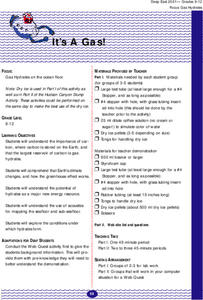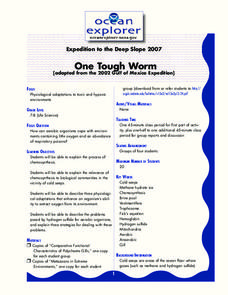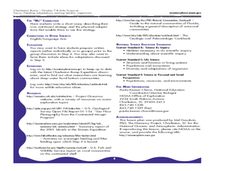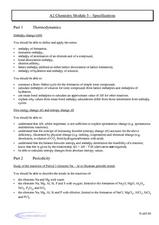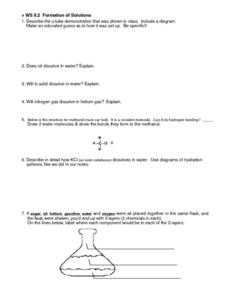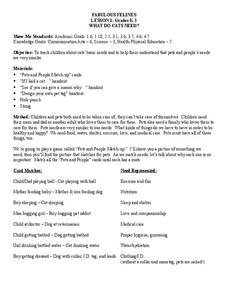Curated OER
Animals of the Fire Ice
Students study ice worms and describe how they interact with other species. In this methane hydrate instructional activity students study ice worms and hydrate shrimp to learn their behavior and can participate in an optional activity.
Curated OER
What's the Big Deal?
Students explore and define methane hydrates and describe ways that it can impact their own lives. In this methane hydrate lesson students create a molecular model and research methane hydrate.
Curated OER
Entering The Twilight Zone
In this lesson sixth grade young scholars get into groups and research a given ocean habitat. The major features of cold-seep communities are the objective but plenty information is given about other habitats which could be assigned to...
Curated OER
WS 10.12 Review
In this organic molecules worksheet, students draw molecules given their names, they draw line isomers for a given compound, they predict products of reactions, they write equations for hydration reactions and they write chemical equations.
Curated OER
An Introduction to Nutrition
Whether you need a new textbook for your health class, or a few exercises and passages for your lesson on nutrition, you'll find what you need with a thorough nutritional science resource. With 15 chapters that cover elements of...
Outdoor Learning Center
Outdoor Survival
Which of the following can you survive without for the longest time: water, food, or a positive mental attitude? The answer may surprise you. Guide learners of all ages through games, activities, and discussions about surviving in the...
Curated OER
What's the Big Deal?
Learners define terms and describe where they are found and formed. In this methane lesson plan students complete an activity and describe ways in which methane hydrates impact our lives.
Curated OER
It's a Gas!
Pupils explore the conditions under which hydrates form. They use the Internet to access information and conduct experiments to examine how the greenhouse effect works.
NOAA
Energy from the Oceans
Can Earth's oceans produce a steady supply of clean energy? Scholars explore the uses of tidal and thermal energy in the 11th installment of a 13-part series about ocean-based alternative energy sources. Learners examine the current...
Curated OER
The Big Burp: Where's the Proof.
Students explore the Cambrian explosion and Paleocene extinction events. In this climate change lesson, students read articles to link evidence they find to extinction and climate change. Links to the articles are included in the lesson.
Curated OER
One Tough Worm
Young scholars explain the process of chemosynthesis and its relevance to biological communities. In this investigative lesson students discuss chemosynthetic communities, then in groups they are assigned a species and are to calculate...
Curated OER
Life is Weird
Students study the organisms that are found in cold seeps and see how they interact with each-other. In this biological organism lesson students describe the major features of cold seeps and the process of chemosynthesis.
Curated OER
This Life Stinks
High schoolers study how organisms that live in cold seep communities get energy from methane. In this organism lesson students write a brief report and identify oxidation reduction reactions and explain if these are dependent of...
Curated OER
The Peanut Wizard
Students read and discuss information regarding George Washington Carver and how the peanut became cultivated in the southern colonies of the United States. In this George Washington Carver lesson, students develop vocabulary that...
Curated OER
Pronoun Shift
Having problems with shifty pronouns? The 10 prompts on this activity challenge young grammarians to recognize pronoun shifts and correct those sentences that contain errors.
Special Olympics
Train at School
Here is a fantastic compilation of adaptive physical education lesson plans that cover the major concepts of physical fitness, including: aerobic endurance, balance, coordination, flexibility, power, speed and agility, and strength.
Normal Community High School
Golf Ball Lab
The first golf balls were made of wood and would only last for a few games. Modern golf balls last a lot longer but they don't float. The presentation provides the directions for a lab to determine the minimum amount of salt needed to...
Curated OER
How Am I Supposed to Eat THAT?
Young scholars explain nutritional strategies of benthic organisms.They describe nutritional strategies of benthic organisms and describe these physical characteristics.
Curated OER
Chemistry Module 5 - Specifications
While this resource does not provide problems for chemistry learners to solve, it outlines skills that they should have and concepts that they should grasp. Topics include thermodynamics, periodicity, redox equilibria, transition metals,...
Curated OER
WS 8.2 Formation of Solutions
In this solutions learning exercise, students answer questions about the solubility of various substances in solvents such as oil in water and nitrogen gas in helium. They draw water molecules to show bonding between them and they...
Curated OER
Predicting the pH of Salt Solutions
A single page provides you with lecture notes for your lesson on hydrolysis. Introduce your chemistry class to Bronsted-Lowry theory by explaining the hydrolysis of acidic cations and basic anions. Show them how the resulting pH can be...
Curated OER
Fabulous Felines
Students explore basic needs through discovering that pets and people need very similar things. They will play matching games, sing songs, read books, and discuss the needs of people and animals.
NOAA
Exploring Potential Human Impacts
Arctic sea ice reflects 80 percent of sunlight, striking it back into space; with sea ice melting, the world's oceans become warmer, which furthers global warming. These activities explore how humans are impacting ecosystems around the...
NOAA
Deep-Sea Ecosystems – Entering the Twilight Zone
Imagine an ecosystem without any light or oxygen, where living things convert carbon dioxide into food. This ecosystem is thriving and might just be the largest ecosystem on our planet, yet we know very little about it. The instructional...
Other popular searches
- Composition of Hydrates
- Chemistry Labs of Hydrates
- Chemistry Hydrates
- Science Chemistry Hydrates
- Lab on Hydrates
- Hydrates Lab









